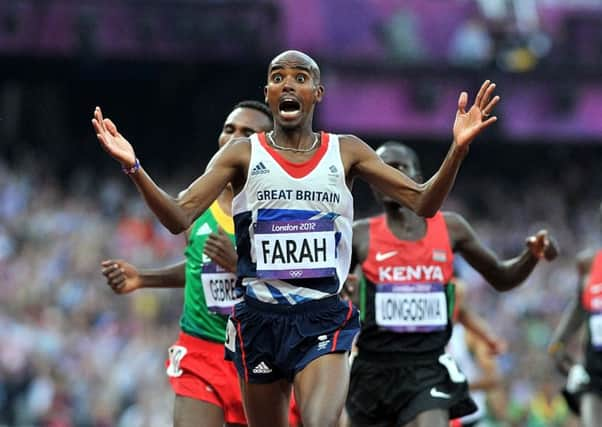Anti-doping chief: Missing two tests ‘not common’


The Daily Mail reported that Farah, who won gold in the 5,000 and 10,000 metres in London, missed a first test early in 2010 with another the following year. Under the “three strikes” system, a third missed appointment would have counted as a doping offence and would then have led to a maximum two-year ban. Under updated regulations the ban could now be up to four years.
Video evidence submitted to UK Anti-Doping (UKAD) by Farah’s agent Ricky Simms aiming to show the runner had not heard the doorbell may also have helped avert any possible charge for deliberately trying to evade testers.
Advertisement
Hide AdAdvertisement
Hide AdUnder the “whereabouts” system, athletes have to register where they will be for a specific hour every day so that testers can be sure of their location. If they are not where they say they will be three times in the space of a year then it is judged as a doping offence.
Last year there were 266 British athletes on the testing register, each of whom would have a minimum of three tests a year, and there were a total of 37 missed tests. The BBC reported that nine UK athletes missed two tests in the same year as Farah did. UKAD chief executive Nicole Sapstead would not discuss individual cases or reveal how many athletes were on two strikes but said: “It is not common for athletes to have two missed tests.”
UKAD’s legal director Graham Arthur said any evidence of a deliberate attempt to avoid testers would lead to an immediate doping charge. Arthur said: “If someone has deliberately not opened their door and deliberately hidden from the testers then we would take action against them for evasion, which carries up to a four-year ban.
“If they have put themselves in a place where they are not able to hear the doping control people arrive or ring the doorbell and we are satisfied they are just being negligent and not wilful then it counts as a missed test.
“It shouldn’t be equated with someone dodging tests. If we felt they had been wilful and didn’t want to be tested then action would be taken for trying to evade the testers.”
Farah, 32, is currently in the spotlight in the wake of doping allegations made by the BBC’s Panorama programme against his coach Alberto Salazar and American training partner Galen Rupp. Both men have denied the claims. There is no suggestion Farah has been involved in doping. The first missed test took place before Farah was working with Salazar with the second allegedly being in February 2011, after the double world champion became part of the Nike Oregon Project in Portland, according to the Daily Mail.
Farah claimed he did not hear the doorbell when missing his second test and his agent submitted video evidence to back up that defence, the newspaper reported. Salazar is then quoted as telling Farah in May 2011: “If you miss another test, they will hang you.’’
The report publishes emails apparently exchanged between UKAD’s lawyers and Farah’s representatives in which the lawyers say: “Intent and negligence are not the same thing, though, as I am sure you have advised him. The simple fact with this Missed Test is that your client says that he did not intend to miss the test, but it is clearly his own fault that he did.’’
Advertisement
Hide AdAdvertisement
Hide AdUKAD’s legal team is understood to be investigating how its emails got into the public domain.
The most high-profile case of a British athlete missing three out-of-competition tests came in 2006 when 400m runner Christine Ohuruogu was hit with a one-year ban. There was no suggestion of any involvement in doping and Ohuruogu, who was 22 at the time of the ban, made a successful return to the sport, going on to win two world titles and one Olympic gold.
Yesterday a number of British athletes voiced their support for Farah. Kelly Sotherton, who won heptathlon bronze at the Athens Olympics in 2004, tweeted: “All these people who think it’s easy not to miss tests. You do it for a year and see how you get on. It’s not as easy as you all suggest.”
Scottish steeplechaser Eilish McColgan, the daughter of former world champion Liz, said on social media: “Luckily I’ve never missed a test but there’s been several times where I’ve missed my slot! Easily done…”
Farah announced on Wednesday he would return to the track for the first time since the doping allegations against Salazar emerged at the Monaco Diamond League meeting on 17 July.
He pulled out of the Sainsbury’s Birmingham Grand Prix earlier this month, stating he was “physically and emotionally drained” by the affair and returned to Portland to seek answers from Salazar. A week after competing in Monaco, Farah is due to race at the Sainsbury’s Anniversary Games in London.